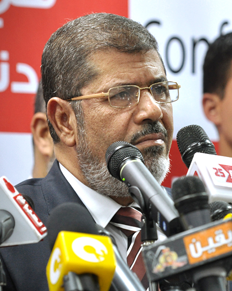1 Hosni Mubarak
2 Muhammad Morsi Isa al-Ayyat
3 Ahmed Mohamed Shafik Zaki
4 Hamdeen Sabahi
Ans : 2

Muhammad Morsi Isa al-Ayyat, born 20 August 1951 is an Egyptian politician who was elected President of Egypt in June 2012.
Morsi was a Member of Parliament in the People's Assembly of Egypt from 2000 to 2005 and a leading figure in the Muslim Brotherhood. He became Chairman of the Freedom and Justice Party (FJP), a political party, when it was founded by the Muslim Brotherhood in the wake of the 2011 Egyptian revolution. He stood as the FJP's candidate for the May–June 2012 presidential election.
On 24 June 2012, the election commission announced that Morsi won Egypt's presidential runoff against Ahmed Shafiq, the last prime minister under deposed leader Hosni Mubarak. According to official results, Morsi took 51.7 percent of the vote while Shafiq received 48.3. Morsi resigned from his position as the head of the FJP after his victory was announced.
The Jamaat-e-Islami on celebrated the victory of the Muslim Brotherhood candidate Mohammed Morsi as the president of Egypt.Thanks-giving rallies were organised in different cities and towns of Khyber Pakhtunkhwa on the call of the JI provincial president Prof Mohammad Ibrahim.
The main rally was held in Peshawar and was led by the JI provincial general secretary Shabbir Ahmad Khan, district president Bahrullah, Khateeb of the historic Mohabat Khan Mosque Maulana Mohammad Yousaf Qureshi and others. The JI workers’ procession started from the Mohabat Khan Mosque and assembled at the Chowk Yadgar for the public meeting.
The participants were carrying portraits of the founder of Muslim Brotherhood Hasnul Banna, founder of the JI Abul A’ala Maududi and Mohammed Morsi.They were holding placards and banners inscribed with slogans rejoicing at the victory of the Muslim Brotherhood in Egypt and calling for an Islamic revolution.
The JI leaders in their speeches said the victory was a source of inspiration for the Islamic movements across the world. They expressed their optimism for a similar victory of the religious forces in Pakistan.
Later sweets were distributed among the participants of the rally.Similar rallies were also held in Nowshera, Dera Ismail Khan, Batkhela, Mingora, Timergara and other cities and towns.In Batkhela, the rally was led by former MNA and the JI district president Syed Bakhtiar Maani.
Ending a week of speculation, Egypt has a new president in Mohammed
Morsi. The Muslim Brotherhood-backed candidate was declared the winner
in the June 16-17 presidential run-off polls, beating rival Ahmed Shafiq
- a former prime minister under strongman Hosni Mubarak's regime - by a
margin of around 9,00,000 votes. Morsi's victory is an outcome of the
pro-democracy movement that started 16 months ago. That his election to
the highest civilian office in Egypt breaks a long-running trend of
presidents from the country's armed forces, reaffirms the precious
democratic gains made during last year's Arab Spring. However, serious
challenges remain. Morsi inherits a deeply divided country, a large
section of which continues to be fearful of the Muslim Brotherhood's
agenda. If he is to become a truly representative president, he must
devote himself to upholding the rights of all sections of society,
including women as well as Egypt's sizeable Coptic Christian minority.
But that certainly won't be easy. Following a recent slew of
constitutional promulgations by the Supreme Council of the Armed Forces
(SCAF) overseeing the democratic transition, the new president's powers
are to be signi-ficantly curtailed. Besides, having already dissolved
the Islamist-dominated parliament elected earlier this year, SCAF not
only retains legislative powers until the formation of a new parliament
but also has the authority to pilot the drafting of a new Constitution.
While this may offset threats to Egypt's secular credentials in the
short term, the army must hand over power to the civilian government as
promised. Failing to do so would strengthen radical Islamists and could
even lead to a civil war. As the most politically and culturally
significant country in the Arab world, Egypt must show the way to
political reconciliation and a secular Arab democracy.
No comments:
Post a Comment